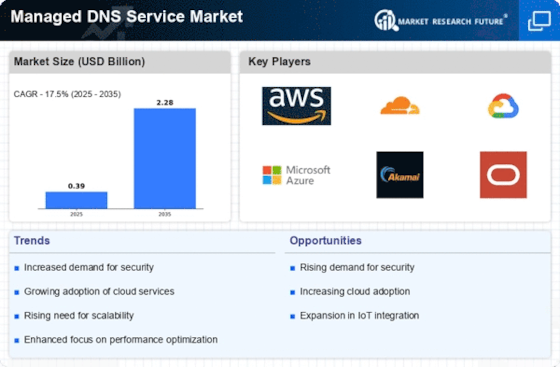-
Executive Summary
-
Market Attractiveness Analysis
- Global Managed Dns Services Market, By Service Type
- Global Managed Dns Services Market, By Organization Size
- Global Managed Dns Services Market, By End User
- Global Managed Dns Services Market, By Region 2 Market Introduction
-
Definition
-
Scope Of The Study
-
Market Structure
-
Macro Factor Indicator Analysis 3 Research Methodology
-
Research Process
-
Primary Research
-
Secondary Research
-
Market Size Estimation
-
Forecast Model
-
List Of Assumptions 4 Market Insights 5 Market Dynamics
-
Introduction
-
Drivers
- Growing Number Of Distributed Denial Of Service (Ddos) Attacks
- Low Cost Associated With Managed Dns Service
- Drivers Impact Analysis
-
Restraints
- Wide Availability Of Free Dns Services
- Restraints Impact Analysis
-
Opportunities
-
Challenges
- Lack Of Awareness About Managed Dns Services
-
Technological Trend
-
Regulatory Landscape / Standards 6 Market Factor Analysis
-
Supply/Value Chain Analysis
- R&D
- Manufacturing
- Distribution & Sales
- Post-Sales Monitoring
-
Porter’s Five Forces Model
- Threat Of New Entrants
- Bargaining Power Of Suppliers
- Bargaining Power Of Buyers
- Threat Of Substitutes
- Intensity Of Rivalry 7 Global Managed Dns Services Market, By Service Type
-
Overview
-
Premium/ Advance Dns
- Premium/ Advance Dns: Market Estimates & Forecast, By Region/Country, 2023–2030
-
Ddos Protected Dns
- Ddos Protected Dns: Market Estimates & Forecast, By Region/Country, 2023–2030
-
Geodns
- Geodns: Market Estimates & Forecast, By Region/Country, 2023–2030 8 Global Managed Dns Services Market, By Organization Size
-
Overview
-
Small & Medium Enterprise
- Small & Medium Enterprise: Market Estimates & Forecast, By Region/Country, 2023–2030
-
Large Enterprise
- Large Enterprise: Market Estimates & Forecast, By Region/Country, 2023–2030 9 Global Managed Dns Services Market, By End–User
-
Overview
-
Media & Entertainment
- Bfsi: Market Estimates & Forecast, By Region/Country, 2023–2030
-
Banking, Financial Services, And Insurance (Bfsi)
- Banking, Financial Services, And Insurance (Bfsi): Market Estimates & Forecast, By Region/Country, 2023–2030
-
Healthcare
- Healthcare: Market Estimates & Forecast, By Region/Country, 2023–2030
-
Retail & Consumer Goods
- Retail & Consumer Goods: Market Estimates & Forecast, By Region/Country, 2023–2030
-
Government
- Government: Market Estimates & Forecast, By Region/Country, 2023–2030
-
Education
- Aerospace & Defense: Market Estimates & Forecast, By Region/Country, 2023–2030
-
E-Commerce
- Aerospace & Defense: Market Estimates & Forecast, By Region/Country, 2023–2030
-
Others
- Others: Market Estimates & Forecast, By Region/Country, 2023–2030 10 Global Managed Dns Services Market, By Region
-
Overview
-
North America
- Us
- Canada
- Mexico
-
Europe
- Germany
- Uk
- France
- Rest Of Europe
-
Asia-Pacific
- China
- Japan
- India
- Rest Of Asia-Pacific
-
Middle East & Africa
-
South America 11 Competitive Landscape
-
Competitive Overview
-
Competitor Dashboard
-
Major Growth Strategy In The Global Managed Dns Services Market
-
Competitive Benchmarking
-
Market Share Analysis
-
Cyber Security: The Leading Player In Terms Of Number Of Developments In Global Managed Dns Services Market
-
Key Developments & Growth Strategies
- New Product Launch/Service Development
- Merger & Acquisition
- Joint Ventures 12 Company Profiles
-
Cloudflare, Inc.
- Company Overview
- Financial Overview
- Products Offerings
- Key Developments
- Swot Analysis
- Key Strategies
-
Cloudns
- Company Overview
- Financial Overview
- Products Offerings
- Key Developments
- Swot Analysis
- Key Strategies
-
Neustar, Inc.
- Company Overview
- Financial Overview
- Products Offerings
- Key Developments
- Swot Analysis
- Key Strategies
-
Oracle Corporation (Dyn)
- Company Overview
- Financial Overview
- Products Offerings
- Key Developments
- Swot Analysis
- Key Strategies
-
Google Inc.
- Company Overview
- Financial Overview
- Products Offerings
- Key Developments
- Swot Analysis
- Key Strategies
-
Amazon Web Services, Inc.
- Company Overview
- Financial Overview
- Products Offerings
- Key Developments
- Swot Analysis
- Key Strategies
-
Akamai Technologies
- Company Overview
- Financial Overview
- Products Offerings
- Key Developments
- Swot Analysis
- Key Strategies
-
Easydns Technologies Inc.
- Company Overview
- Financial Overview
- Products Offerings
- Key Developments
- Swot Analysis
- Key Strategies
-
Namecheap.Com
- Company Overview
- Financial Overview
- Products Offerings
- Key Developments
- Swot Analysis
- Key Strategies
-
Cdnetworks Inc.
- Company Overview
- Financial Overview
- Products Offerings
- Key Developments
- Swot Analysis
- Key Strategies
-
Verisign, Inc.
- Company Overview
- Financial Overview
- Products Offerings
- Key Developments
- Swot Analysis
- Key Strategies
-
Thousandeyes, Inc.
- Company Overview
- Financial Overview
- Products Offerings
- Key Developments
- Swot Analysis
- Key Strategies
-
No–Ip.Com
- Company Overview
- Financial Overview
- Products Offerings
- Key Developments
- Swot Analysis
- Key Strategies
-
Rackspace Us, Inc.
- Company Overview
- Financial Overview
- Products Offerings
- Key Developments
- Swot Analysis
- Key Strategies
-
Contegix,
- Company Overview
- Financial Overview
- Products Offerings
- Key Developments
- Swot Analysis
- Key Strategies
-
Appendix
-
References
-
Related Reports
-
List Of Abbreviation 14 List Of Tables
-
List Of Assumptions
-
Global Managed Dns Service Market, By Service Type, 2023–2030 (Usd Million)
-
Global Managed Dns Service Market, By Organization Size, 2023–2030 (Usd Million)
-
Global Managed Dns Service Market, By Vertical, 2023–2030 (Usd Million)
-
Global Managed Dns Service Market, By Region, 2023–2030 (Usd Million)
-
North America: Managed Dns Service Market, By Country, 2023–2030 (Usd Million)
-
North America: Managed Dns Service Market, By Service Type, 2023–2030 (Usd Million)
-
North America: Managed Dns Service Market, By Organization Size, 2023–2030 (Usd Million)
-
North America: Managed Dns Service Market, By Vertical, 2023–2030 (Usd Million)
-
Us: Managed Dns Service Market, By Service Type, 2023–2030 (Usd Million)
-
Us: Managed Dns Service Market, By Organization Size, 2023–2030 (Usd Million)
-
Us: Managed Dns Service Market, By Vertical, 2023–2030 (Usd Million)
-
Canada: Managed Dns Service Market, By Service Type, 2023–2030 (Usd Million)
-
Canada: Managed Dns Service Market, By Organization Size, 2023–2030 (Usd Million)
-
Canada: Managed Dns Service Market, By I Vertical, 2023–2030 (Usd Million)
-
Mexico: Managed Dns Service Market, By Service Type, 2023–2030 (Usd Million)
-
Mexico: Managed Dns Service Market, By Organization Size, 2023–2030 (Usd Million)
-
Mexico: Managed Dns Service Market, By Vertical, 2023–2030 (Usd Million)
-
Europe: Managed Dns Service Market, By Country, 2023–2030 (Usd Million)
-
Europe: Managed Dns Service Market, By Service Type, 2023–2030 (Usd Million)
-
Europe: Managed Dns Service Market, By Organization Size, 2023–2030 (Usd Million)
-
Europe: Managed Dns Service Market, By Vertical, 2023–2030 (Usd Million)
-
Uk: Managed Dns Service Market, By Service Type, 2023–2030 (Usd Million)
-
Uk: Managed Dns Service Market, By Organization Size, 2023–2030 (Usd Million)
-
Uk: Managed Dns Service Market, By Vertical, 2023–2030 (Usd Million)
-
Germany: Managed Dns Service Market, By Service Type, 2023–2030 (Usd Million)
-
Germany: Managed Dns Service Market, By Organization Size, 2023–2030 (Usd Million)
-
Germany: Managed Dns Service Market, By Vertical, 2023–2030 (Usd Million)
-
France: Managed Dns Service Market, By Service Type, 2023–2030 (Usd Million)
-
France: Managed Dns Service Market, By Organization Size, 2023–2030 (Usd Million)
-
France: Managed Dns Service Market, By Vertical, 2023–2030 (Usd Million)
-
Rest Of Europe: Managed Dns Service Market, By Service Type, 2023–2030 (Usd Million)
-
Rest Of Europe: Managed Dns Service Market, By Organization Size, 2023–2030 (Usd Million)
-
Rest Of Europe: Managed Dns Service Market, By Vertical, 2023–2030 (Usd Million)
-
Asia-Pacific: Managed Dns Service Market, By Country, 2023–2030 (Usd Million)
-
Asia-Pacific: Managed Dns Service Market, By Service Type, 2023–2030 (Usd Million)
-
Asia-Pacific: Managed Dns Service Market, By Organization Size, 2023–2030 (Usd Million)
-
Asia-Pacific: Managed Dns Service Market, By Vertical, 2023–2030 (Usd Million)
-
China: Managed Dns Service Market, By Service Type, 2023–2030 (Usd Million)
-
China: Managed Dns Service Market, By Organization Size, 2023–2030 (Usd Million)
-
China: Managed Dns Service Market, By Vertical, 2023–2030 (Usd Million)
-
India: Managed Dns Service Market, By Service Type, 2023–2030 (Usd Million)
-
India: Managed Dns Service Market, By Organization Size, 2023–2030 (Usd Million)
-
India: Managed Dns Service Market, By Vertical, 2023–2030 (Usd Million)
-
Japan: Managed Dns Service Market, By Service Type, 2023–2030 (Usd Million)
-
Japan: Managed Dns Service Market, By Organization Size, 2023–2030 (Usd Million)
-
Japan: Managed Dns Service Market, By Vertical, 2023–2030 (Usd Million)
-
Rest Of Asia-Pacific: Managed Dns Service Market, By Service Type, 2023–2030 (Usd Million)
-
Rest Of Asia-Pacific: Managed Dns Service Market, By Organization Size, 2023–2030 (Usd Million)
-
Rest Of Asia–Pacific: Managed Dns Service Market, By Vertical, 2023–2030 (Usd Million)
-
Middle East And Africa: Managed Dns Service Market, By Service Type, 2023–2030 (Usd Million)
-
Middle East And Africa: Managed Dns Service Market, By Organization Size, 2023–2030 (Usd Million)
-
Middle East And Africa: Managed Dns Service Market, By Vertical, 2023–2030 (Usd Million)
-
South America: Managed Dns Service Market, By Service Type, 2023–2030 (Usd Million)
-
South America: Managed Dns Service Market, By Organization Size, 2023–2030 (Usd Million)
-
South America: Managed Dns Service Market, By Vertical, 2023–2030 (Usd Million) 15 List Of Figures
-
Market Synopsis
-
Research Process Of Mrfr
-
Top Down & Bottom–Up Approach
-
Global Managed Dns Service Market, By Service Type, 2023–2030 (Usd Million)
-
Global Managed Dns Service Market, By Organization Size, 2023–2030 (Usd Million)
-
Global Managed Dns Service Market, By Vertical, 2023–2030 (Usd Million)
-
Global Managed Dns Service Market, By Region, 2023–2030 (Usd Million)
-
Global Managed Dns Service Market, By Region, 2023–2030 (Usd Million)
-
North America: Managed Dns Service Market, By Country, 2023–2030 (Usd Million)
-
North America: Managed Dns Service Market, By Service Type, 2023–2030 (Usd Million)
-
North America: Managed Dns Service Market, By Organization Size, 2023–2030 (Usd Million)
-
North America: Managed Dns Service Market, By Vertical, 2023–2030 (Usd Million)
-
Europe: Managed Dns Service Market, By Country, 2023–2030 (Usd Million)
-
Europe: Managed Dns Service Market, By Service Type, 2023–2030 (Usd Million)
-
Europe: Managed Dns Service Market, By Organization Size, 2023–2030 (Usd Million)
-
Europe: Managed Dns Service Market, By Vertical, 2023–2030 (Usd Million)
-
Asia-Pacific: Managed Dns Service Market, By Country, 2023–2030 (Usd Million)
-
Asia-Pacific: Managed Dns Service Market, By Service Type, 2023–2030 (Usd Million)
-
Asia-Pacific: Managed Dns Service Market, By Organization Size, 2023–2030 (Usd Million)
-
Asia-Pacific: Managed Dns Service Market, By Vertical, 2023–2030 (Usd Million)
-
Middle East & Africa: Managed Dns Service Market, By Service Type, 2023–2030 (Usd Million)
-
Middle East & Africa: Managed Dns Service Market, By Organization Size, 2023–2030 (Usd Million)
-
Middle East & Africa: Managed Dns Service Market, By Vertical, 2023–2030 (Usd Million)
-
South America: Managed Dns Service Market, By Service Type, 2023–2030 (Usd Million)
-
South America: Managed Dns Service Market, By Organization Size, 2023–2030 (Usd Million)
-
South America: Managed Dns Service Market, By Vertical, 2023–2030 (Usd Million)


















Leave a Comment